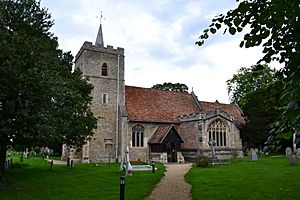Church of All Saints, Little Shelford facts for kids
Quick facts for kids Church of All Saints |
|
|---|---|
 |
|
| 52°08′39″N 0°07′22″E / 52.1442°N 0.1227°E | |
| Location | Church Street, Little Shelford, Cambridgeshire, CB22 5HG |
| Country | England |
| Denomination | Church of England |
| Churchmanship | Evangelical |
| History | |
| Status | Active |
| Dedication | All Saints |
| Architecture | |
| Functional status | Parish Church |
| Heritage designation | Grade II* listed |
| Designated | 31 August 1962 |
| Administration | |
| Parish | Little Shelford |
| Deanery | Granta |
| Archdeaconry | Cambridge |
| Diocese | Ely |
The Church of All Saints is a Church of England church in Little Shelford, Cambridgeshire. It's a special building, protected as a Grade II* listed building, and parts of it are from the 12th century.
Contents
History of the Church
The Church of All Saints is located by a crossroads. It has thirteen beautiful lime trees and an old market cross nearby. This church is very old, dating back to before the Norman Conquest in 1066. It's one of the oldest churches in the area!
Ancient Stones and Carvings
Inside the church, you can find stones carved by the Saxons, who lived in England before the Normans. These stones have cool braided patterns. There's also a small Norman window and a carved coffin stone in the porch that might be Saxon.
In the chapel, there are four more stones that are probably Norman. Look for a strange animal with human arms holding up an arch from the 13th century. The main part of the church, called the chancel, was built in the 14th century.
Special Features Inside
The small room called the sacristy was built in the 15th century. It has an old door and three holes in a windowsill that were used for washing sacred items. The wooden pulpit, where the priest gives sermons, is from the Jacobean period (early 1600s).
The font, used for baptisms, is about 600 years old, just like the tiny church spire.
The de Freville Family Chapel
The church has a chapel from the 15th century that belonged to the de Freville family. They were important landowners, known as the Lords of the Manor. Their family coat of arms can be seen on the church stalls.
The de Freville chapel has beautiful stone decorations. You can see them on a piscina (a basin for washing) and on a canopy over a saint's statue. There are also small pieces of old stained glass in the windows.
Some members of the de Freville family are buried in the church. Sir John de Freville, who lived in the early 1300s, has a stone statue of himself. Later, in the late 1300s, Robert de Freville and his wife Claricia were buried here. Their brass memorial shows them holding hands, with a greyhound and two dogs at their feet. Their son, Thomas de Freville, is also shown holding his wife's hand in a brass memorial from 1405.
A rector named John Cate, who lived in the 15th century, also has a detailed brass portrait in the church.
The Church Today
On August 31, 1962, the Church of All Saints was officially recognized as a Grade II* listed building. This means it's a very important historical building that needs to be protected.
In 1996, the church became a "church plant" from St Andrew the Great, Cambridge. This means it was restarted or strengthened with help from another church.
All Saints Church follows a specific tradition within the Church of England called Conservative Evangelical. This means they have certain beliefs and practices. For example, they have decided not to have women as priests.
Rectors of All Saints Church
A rector is the main priest in charge of a church parish. Here is a list of the rectors who have served at All Saints Church over many centuries:
- 1324: John de Barenton
- 1380: Walter Knight
- 1393: Robert Cook
- 1408: Thomas Patele
- 1408: William Wynbyle
- 1445: John Catte
- 1473: Richard Roche
- 1473: Geoffrey Burrell
- 1494: Thomas Wardell
- 1530: Thomas Hinde
- 1540: Richard Swinbourne
- 1557: John Dale
- 1559: George Fuller
- 1580: John Scarfield
- 1591: Nicholas Richmond
- 1596: Roger Lunn
- 1623: George Wellbourne
- 1627: John Heath
- 1641: George Wigmore
- 1668: William Wells
- 1676: Richard Manninge
- 1709: Roger Gillingham
- 1756: Jeremy Pemberton
- 1758: Thomas Hirst
- 1791: Samuel Ingle
- 1795: John Swaine
- 1802: Martin Hogg
- 1806: Henry Finch
- 1849: William Law
- 1852: James Law
- 1893: Edwin Carr
- 1931: Edward Berwick
- 1950: Edward Sibson
- 1963: William Butler
- 1969: Eric Hague
- 1977: Stephen Taylor
- 1997: Christopher Ash
- 2005: Simon Scott
 | Dorothy Vaughan |
 | Charles Henry Turner |
 | Hildrus Poindexter |
 | Henry Cecil McBay |

